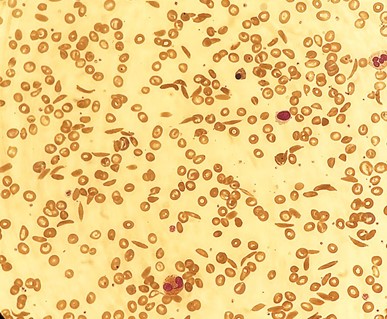A consultant at Black Country Pathology Services (BCPS) is urging people to be more aware of sickle cell disease (SCD) after claiming sufferers often face an ‘inequity of care.”
BCPS, which is made up of all four acute Black Country and West Birmingham NHS Trusts and based at Wolverhampton’s New Cross Hospital, treats many of the approximate 800 adult and 600 paediatric patients with SCD in the West Midlands.
SCD is inherited and it affects predominantly Black and Minority Ethnic (BME) individuals. Patients suffer sickle cell crises, episodes of severe pain on average once a year but which can last up to for seven days.
Patients with SCD often report to a hospital’s emergency department, but as Dr Shivan Pancham, Consultant Haematologist, points out on World Sickle Cell Day, they can be mis-diagnosed as drug addicts. Their treatment can also be delayed while they are assessed and other conditions are ruled out.
Dr Pancham, who has worked with BCPS since its inception in 2018 and at Sandwell and West Birmingham NHS Trust since 2006, said: “This is an opportunity to raise awareness of sickle cell disease. There is a lot of stigma with SCD – patients are often labelled as drug addicts in emergency departments.
“There is inequity in care compared to other disorders. The only cure is a bone marrow transplant, but this is available only to a minority of patients.
“SCD is an inherited disorder affecting red blood cells. It can affect every organ in the body – the classical manifestation is pain which can often be severe enough to warrant strong painkillers.”
A sickle cell crisis often affects a particular part of the body, such as the hands or feet (particularly in young children), ribs and breastbone, spine, pelvis, tummy, legs and arms.
It’s not always clear what triggers severe pain, but sometimes episodes can be caused by the weather, dehydration, stress or strenuous exercise.
Sufferers are more vulnerable to infections, particularly when they’re young.
Infections can range from mild, such as colds, to much more serious and potentially life threatening, such as meningitis. Vaccinations and daily doses of antibiotics can help reduce the risk.
Nearly all people with sickle cell disease have anaemia, where the haemoglobin – found in red blood cells used to transport oxygen around the body – in the blood is low.
Sickle cell disease can also sometimes cause a wide range of other problems, including:
- Delayed growth during childhood and delayed puberty
- Gallstones which can cause tummy pain and jaundice
- Bone and joint pain
- A serious lung condition called acute chest syndrome, which can cause a fever, cough, chest pain cand breathing difficulties
- Swelling of the spleen, which can cause shortness of breath, a rapid heartbeat, tummy pain, a swollen tummy and anaemia
- Eyesight problems
- High blood pressure in the blood vessels that carry blood from the heart to the lungs
- Kidney or urinary problems

